Climate justice and social justice are two sides of the same coin. Addressing both is vital to creating a more equitable and sustainable future for all. Climate justice is rooted in recognising that climate change is causing a multitude of detrimental social, economic, health, and other impacts on vulnerable communities who have contributed the least to the climate crisis. In short, the climate crisis is making existing inequalities and injustices a whole lot worse.
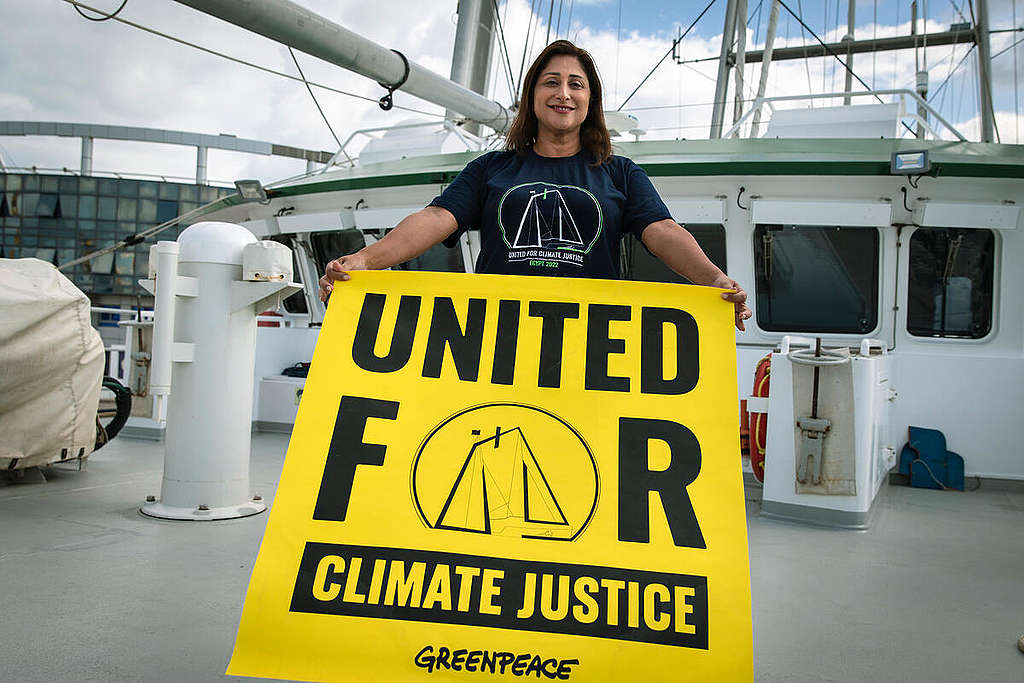 Ghiwa Nakat, Executive Director of Greenpeace MENA onboard the Rainbow Warrior for the United for Climate tour in Egypt. © Andrew McConnell / Greenpeace
Ghiwa Nakat, Executive Director of Greenpeace MENA onboard the Rainbow Warrior for the United for Climate tour in Egypt. © Andrew McConnell / GreenpeaceLow-income countries, people of colour, Indigenous People, women, and people with disabilities are more exposed to the devastating impacts of climate disasters such as floods, wildfires, severe drought and soaring temperatures, as well as rising sea levels and limited access to food and water. This global majority – marginalised and made more vulnerable by powerful systems of oppression – don’t have access to the financial resources and institutional capacity to adapt to climate change nor to recover from the losses and damage that it causes.
The cost of loss and damage is estimated to be between 290 to 580 billion USD per year by 2030 and unfortunately, much of this will be shouldered by developing and least developed countries.
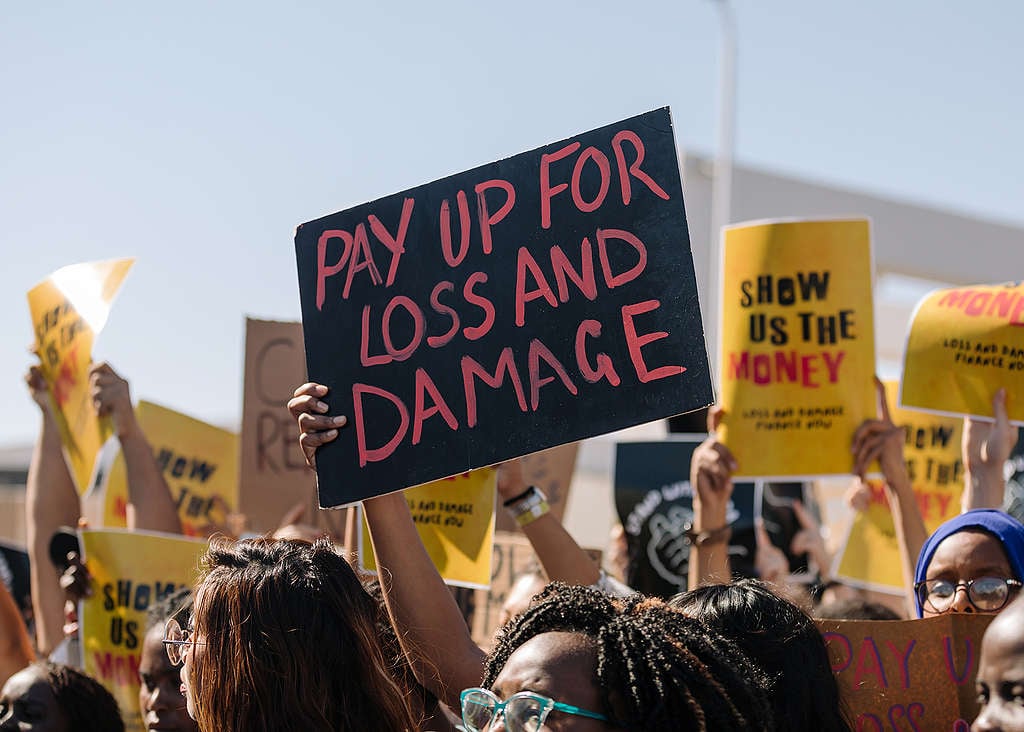 Climate champions at COP27 in Egypt demand that polluting companies and countries pay their fair share to repair climate damage. © Marie Jacquemin / Greenpeace
Climate champions at COP27 in Egypt demand that polluting companies and countries pay their fair share to repair climate damage. © Marie Jacquemin / GreenpeaceWhy climate justice matters
Why does climate justice matter? It matters because it forces the global community and those who bear most responsibility for the climate crisis to work with and support those bearing its brunt. It matters because it addresses a more systemic problem that is the fundamental cause of this crisis and many others. The problem is an economic model based on extractivism and greed that’s causing a planetary crisis and aggravating social injustices around the world.
While the whole world, and more specifically the Middle East North Africa region where I live, struggles with compounding crises — triggered by conflicts, pandemic, social and economic problems, deteriorating living conditions and devastating disasters — big western oil firms, by far some of the largest contributors to the global climate crisis, more than doubled their profits to 219 billion USD in 2022.
MENA is the most water scarce region in the world, and is already warming at twice the global average. Vulnerable communities are now suffering the impact of climate change disproportionately to other parts of the world, whether they are living in deserts or beside the sea, on mountains or in green valleys.
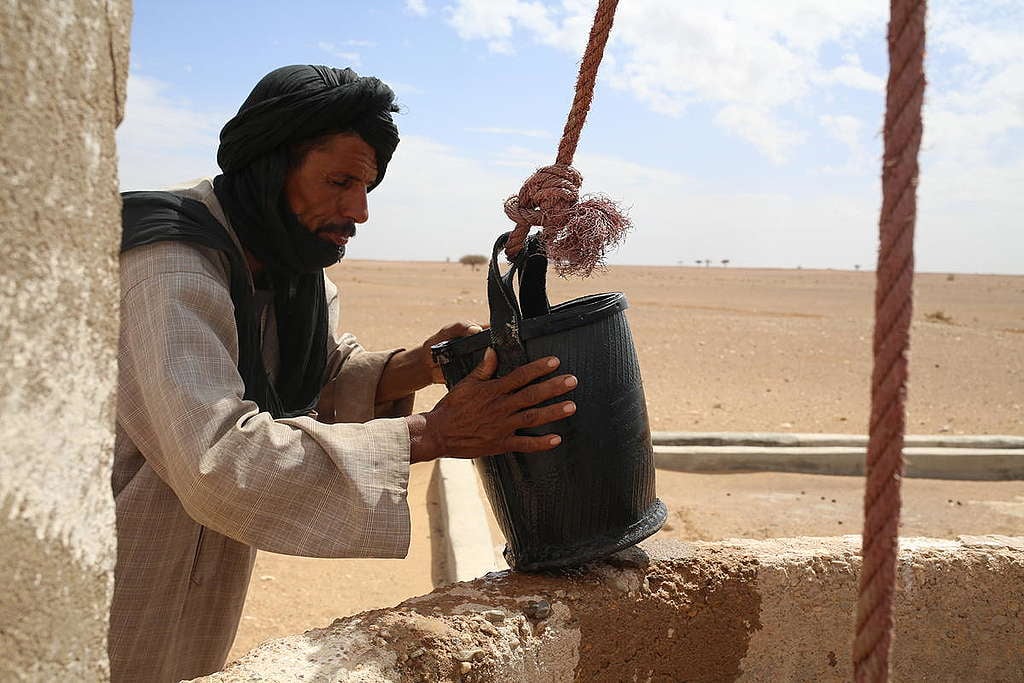 Greenpeace visited and witnessed the climate change impact in one of the Moroccan oases. © Therese di Campo / Greenpeace
Greenpeace visited and witnessed the climate change impact in one of the Moroccan oases. © Therese di Campo / GreenpeaceThis region is facing scorching temperatures that pose a direct risk to human health, as well as longer and more severe droughts with serious implications for agriculture and food security. More frequent climate related disasters are considerably increasing social inequalities and crippling social justice. Lives are being lost, homes destroyed, crops are failing, livelihoods are jeopardised, and cultural heritage is being wiped out.
Bearing witness
At Greenpeace MENA we have witnessed and documented how climate change is putting the region’s entire ecosystem, civilization, people, and heritage at risk. In Morocco, the increasing drying and loss of the oasis ecosystem are threatening the traditional nomadic lifestyle of indigenous people who depend on it. Studies show that olive trees and olive oil production from Egypt to Lebanon is being significantly impacted by rising temperatures. Threats of flooding along the Mediterranean coast are becoming ever more pressing. Ahwari women in Southern Iraq marshlands are the first to suffer from climate change that caused crops to fail, and limited access to water which made it difficult for them to raise and earn a livelihood and support their families, perpetuating the cycle of poverty and inequality.
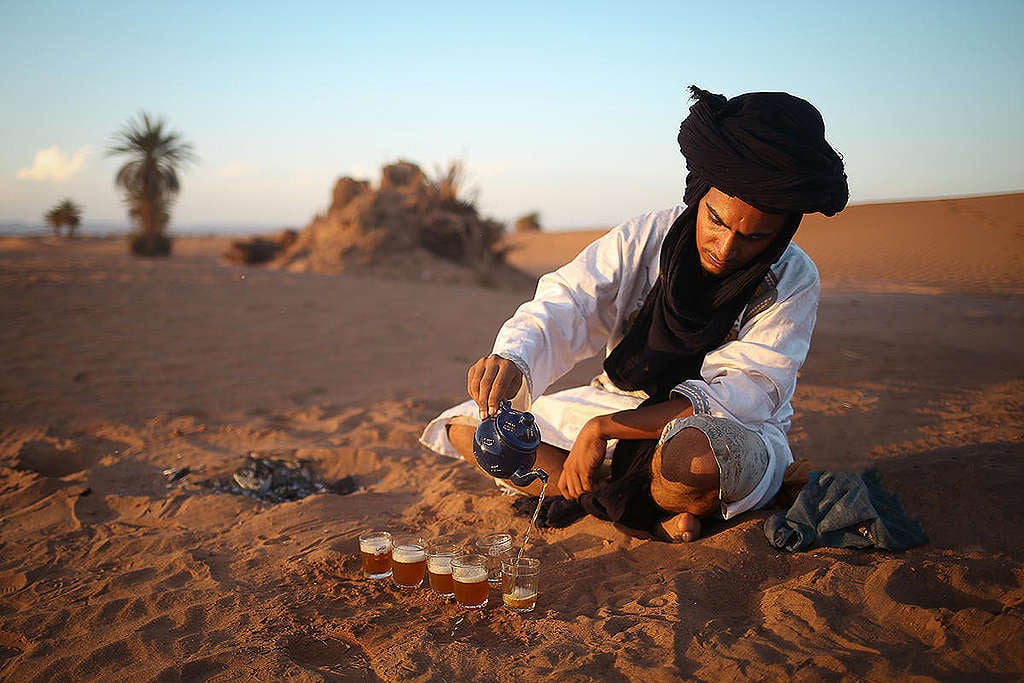 As part of Greenpeace’s campaigns aiming to shed light on the effects of climate change in the MENA, Greenpeace visited and witnessed the climate change impact in one of the Moroccan oases © Therese di Campo / Greenpeace
As part of Greenpeace’s campaigns aiming to shed light on the effects of climate change in the MENA, Greenpeace visited and witnessed the climate change impact in one of the Moroccan oases © Therese di Campo / GreenpeaceAgain and again, we are seeing that the communities most vulnerable to these impacts are also those with the lowest resilience in socioeconomic terms. Climate justice is vital to addressing social justice.
Make polluters pay
Achieving both climate and social justice, requires addressing the historic and ongoing injustices that have contributed to the current existential climate crisis, and empowering local communities to participate in the climate decision-making processes. It requires acknowledging that historical polluting countries and industries are responsible for the crisis the world is facing — and that those who contributed the least to the problem are now suffering most.
It starts by holding polluting corporations and countries accountable and demanding them to pay for the damage they have caused and continue to cause.
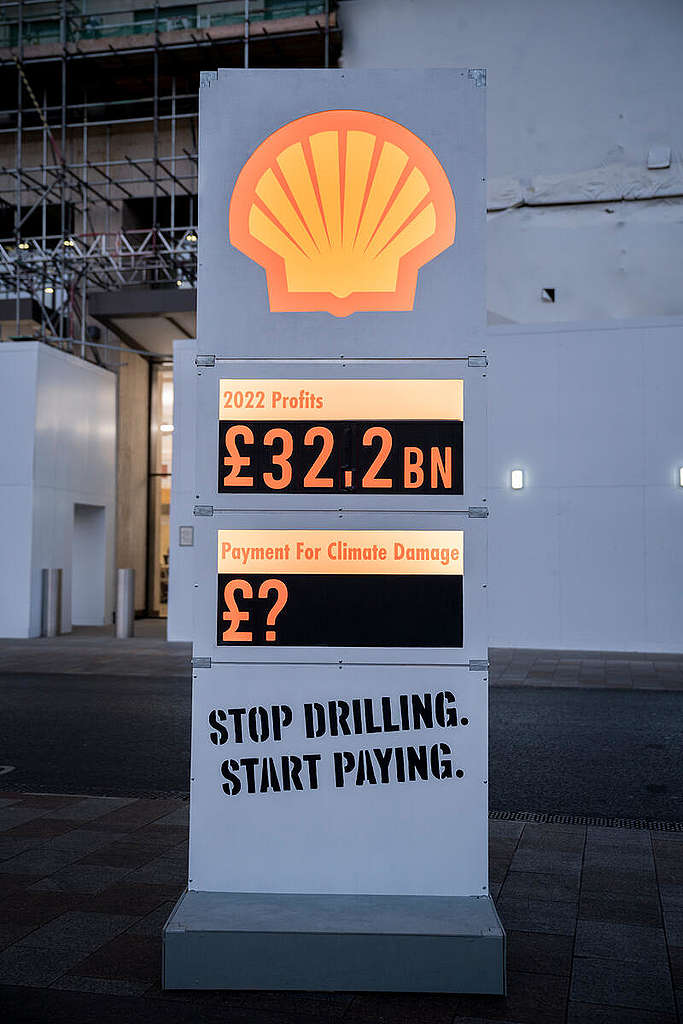 Greenpeace UK activists target Shell headquarters, as Shell posted unprecedented annual profits. Greenpeace are calling on Shell to take responsibility for its historic role in the climate crisis and pay for the devastation it causes around the world. © David Mirzoeff / Greenpeace
Greenpeace UK activists target Shell headquarters, as Shell posted unprecedented annual profits. Greenpeace are calling on Shell to take responsibility for its historic role in the climate crisis and pay for the devastation it causes around the world. © David Mirzoeff / GreenpeaceFossil fuels are responsible for over 75% of global GHG emissions and 90% of CO2 emissions. There is no climate justice without a just phase out of all fossil fuels: coal, oil and gas. The only path to a sustainable and resilient world – and to achieve the social and climate justice we all need – is by adopting an alternative economic model that moves quickly away from it’s addiction to fossil energy, and places people and sustainability over profits and extractivism.
By prioritising climate justice, we can achieve social justice and create a more equitable and sustainable future for all. This is why Climate Justice matters.
Take action now to end fossil fuel crimes and make polluters pay.
Ghiwa Nakat is the Executive Director of Greenpeace Middle East North Africa

 1 year ago
103
1 year ago
103


